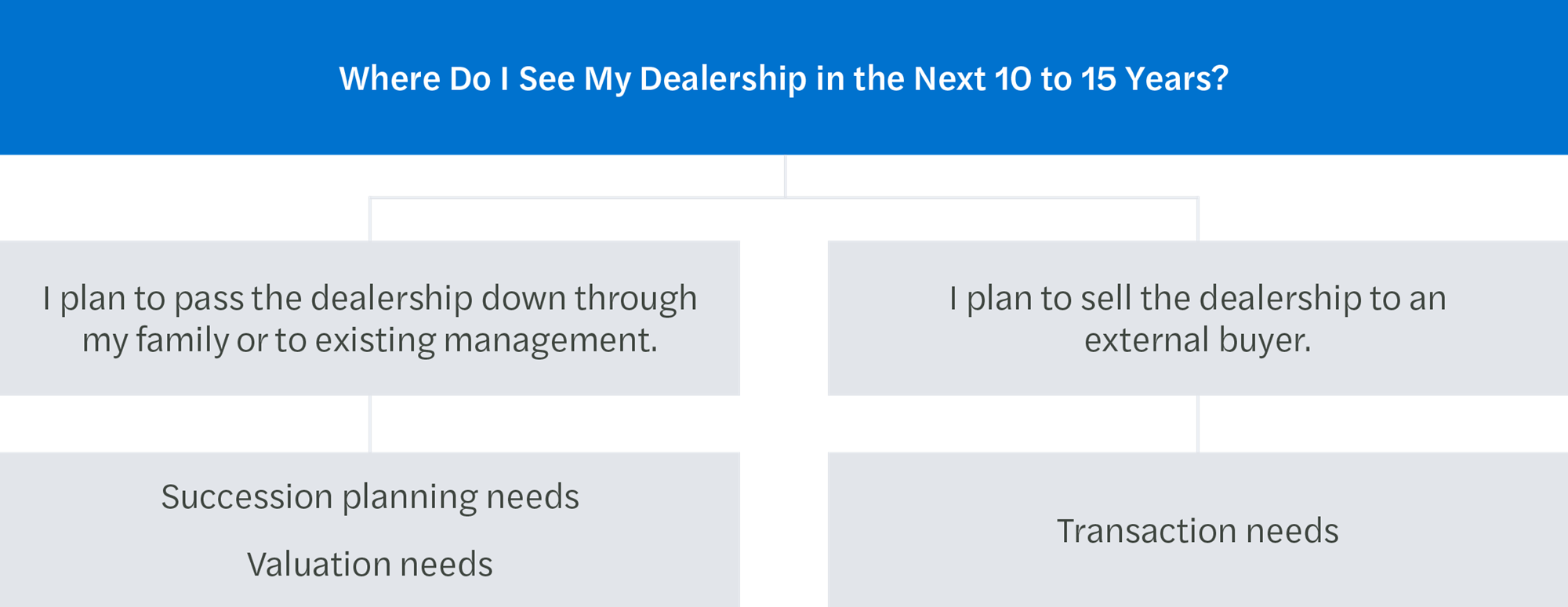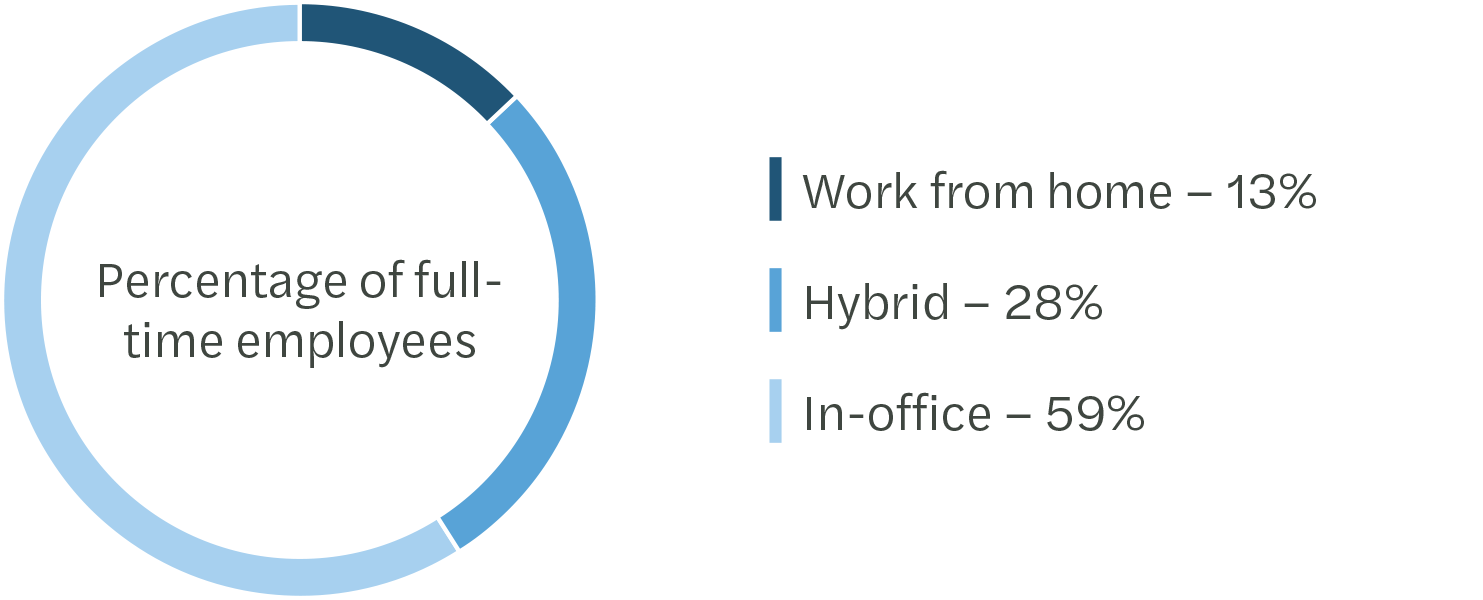This inaugural edition of Accelerate, a quarterly publication for dealerships, delves into trending topics our Dealerships Practice at Forvis Mazars is seeing across auto, machinery and equipment, commercial truck, and recreational groups. Continue reading to learn consolidation, talent, and AI considerations for your dealership.
Consolidation & M&A Implications for Dealerships
Many would say that consolidation and M&A activity are the peak topics for the dealership industry across auto, machinery and equipment, commercial truck, and recreational niches. Reports from those in the industry show that M&A activity continues to stay much higher than pre-pandemic levels, leading to overall consolidation.
Succession Planning Considerations
Dealers are looking to succession planning for their dealership group, whether that's a transfer to the next generation or an external sale. Auto dealerships are currently undergoing a slew of transactions, and while machinery and equipment dealers face stricter guidelines from original equipment manufacturers (OEMs) on owning multiple brands, they're looking into diversifying into other niches, such as commercial trucks. In the past, recreational dealerships may not have stood out in the face of consolidation, but we've recently seen an increase in deals there as well.
Due to the consolidation of the industry, dealers may want to consider stopping and reflecting on where they see their dealership in the next 10 to 15 years. While 10 to 15 years may seem far down the road, it's pertinent to plan now to understand future impacts and consider a suitable succession option from a financial and operational standpoint.
At a high level, there are two options when considering the next step for your dealership: 1) transferring ownership internally or to existing management or 2) selling externally. Both of these options come with various financial impacts.

On the one hand, passing a dealership down through family or to existing management leads to succession planning and valuation needs; on the other, selling to an external buyer—whether that be another dealership group or a professional investor such as private equity or family office—leads to accounting needs related to the transaction activities. Recently, we've seen combinations of owners passing their dealerships on to the next generation and working with family offices or private equity firms for growth opportunities. Each can have its benefits and challenges, but in the end, the decision comes back to the initial question of where the dealer sees their dealership in the next 10 to 15 years.
We'll continue diving deeper into industry consolidation, including accounting and tax implications related to the gift and estate tax exemption sunsetting after 2025 in future articles. For now, we'll look at how consolidation has affected other areas of the industry: talent and cybersecurity.
Dealership Talent & Adapting to New Workplace Models
Talent Shifts in the Industry
Talent, digital transformation, and broader adoption of new workplace models are all connected as we look toward the future of auto, machinery and equipment, commercial truck, and recreational dealerships. Over the last several years, dealership groups have dealt with fluctuations in margin, the impact of digital marketing, changes in consumer purchase behavior, and more. However, when hiring new talent, many dealerships continue to look for the same type of candidates and frequently offer the same outdated type of work environment. The workforce has changed dramatically over the last five years, and the pool of potential candidates has different expectations and goals, and seeks options for greater flexibility at jobs in other industries. In order to attract and retain top talent, different workplace strategies might need to be considered.
Other industries are offering hybrid work models where there were previously in-person-only requirements.1 A 2023 remote work study (see chart below) shows that currently 59% of employees are working in an office full time. The remaining 41% of jobs that offer remote or hybrid positions are likely more appealing to job candidates.

The sentiment of full-time employees having at least some level of hybrid work or flexibility is important for dealers to keep top of mind. As the race for talent becomes more challenging, dealers will need loyal employees to help drive growth, and offering a remote or hybrid work model for accounting and back-office positions could be a competitive talent strategy.
Hybrid Considerations for Accounting & Back-Office Roles
A dealership salary survey2 found that work/life balance was the top reason for employee discontent among automotive employees considering or finding new jobs, surpassing issues such as toxic workplace culture, leaving for better pay/career opportunities, and increased workloads without additional pay. The recent NADA Dealership Workforce Study revealed the average dealership turnover rate was 34%.3 With this data and knowledge, identifying a hybrid work model could be an avenue to improve employee retention.
For roles that do not require daily in-person interaction with customers or vehicles, some level of remote work flexibility could be a powerful motivator to attract and retain talent, especially when it comes to accounting, back-office, and administrative employees. Digital transformation has allowed an opportunity for these functions to have hybrid or remote models. We have observed many dealers who have embraced an element of remote work for their employees with great results—productive employees making positive contributions while still meeting life obligations like childcare or eldercare responsibilities.
Of course, finding a balance between team and culture building, employee work/life balance, and getting the job done can prove to be tricky. It's important for dealer groups to offer career path opportunities for employees to grow professionally so they stay committed and will be rewarded for good performance. As more accounting responsibilities can be done digitally, employees can still get their jobs done, achieve greater work/life balance, and grow their careers within a framework of clear expectations and a healthy balance of hybrid work schedules.
As dealer accounting talent becomes scarce, attracting and retaining good talent are paramount. Dealers who can incorporate a mix of competitive compensation, career growth opportunities, and hybrid schedule flexibility will likely rise to the top. We're expecting to see more and more dealers invest in digital systems that allow for more hybrid or remote work. Those who aren't able to adapt their work model may fall behind in the race for talent.
Diesel Technician Shortages for Commercial Truck Dealers
In addition to the overarching talent shifts and new workplace models across dealerships, one topic that many of today's commercial trucking groups can agree on is the astounding shortage of qualified technicians.
The Next Generation of Talent
Over the next decade, the U.S. Bureau of Labor Statistics projects there will be more than 24,000 openings for diesel service technicians and mechanics each year. Many of these openings are caused by retiring workers and workers who transfer to different occupations. Dealership groups are increasing efforts to attract talent to their shops, including teaming up with local technical colleges, creating mentorship programs, and offering robust compensation packages. The American Trucking Association has even launched a mobile app to engage middle and high school students with virtual truck diagnosis and repair.4
Attracting technicians is one part of the story, but retaining them is the other. According to a survey from Automotive Service Excellence,5 approximately 42% of new diesel technicians leave the field within their first two years. Figuring out ways to retain these highly skilled positions will also need to be a focal point to help maintain a successful fixed-operations shop.
Electric Truck Repair Considerations
A new twist in the playing field over the last few years is incorporating training and competencies for technicians to service not only diesel trucks, but also have the skills to work on electric trucks. As the trucking industry continues to adapt to certain laws and regulations that increase the number of electric trucks on the roads, the mechanics will likely need to be just as skilled with working on computers as they are with a wrench.
Commercial truck dealers looking toward the future should consider keeping talent as a top priority, and integrate training programs and leadership opportunities to retain technicians and keep them agile with changing technologies.
One caveat to consider as dealers integrate more technologies is the cybersecurity and data privacy concerns, similar to what dealers are considering as they invest in AI.
Artificial Intelligence Risks & Impacts on Dealerships
As dealerships accelerate toward the future, we've seen trends in consolidation and talent, but we're also seeing a new way to use data both to potentially help in the areas where dealers are facing challenges and to discover new opportunities to help dealers thrive. One technology continually in the headlines is artificial intelligence (AI).
What Is AI?
AI can be a nebulous term for many. By definition, it refers to a machine or computer system's ability to perform tasks typically performed by humans or that incorporate human intelligence.6 AI consists of programming systems to scrutinize data, learn from past experiences, and make smart decisions guided by human input. A common form of AI is virtual assistants such as Siri or Alexa; however, there are many variations of the technology.
AI Usage & Applicability to Dealerships
The rise in AI's popularity has had a significant impact on the dealership industry across auto, machinery and equipment, commercial truck, and recreational dealers. Many dealers have leveraged AI for a number of benefits:

Risks & Security Concerns When Using AI
While the use of AI provides several benefits and increased efficiency for dealerships, there are also potential risks, including data privacy and security concerns, over-reliance on the technology, bias in algorithms, and implementation and maintenance costs. Dealers should be aware of these risks, as well as potential threats AI can pose through misuse. The leading type of misuse of AI functionality is prompt injection attacks that are designed to manipulate an AI tool into generating malicious content or providing restricted information.
Regulatory Requirements & Laws Related to Development, Deployment, & Use of AI Systems
As your dealership leverages AI or considers its use, there may be various legal and regulatory requirements depending on the type of AI systems, data used, type of business connection, and the location of both your dealership and your customers. AI-specific laws and regulations may also apply to dealerships (indirectly) if they serve as a vendor/supplier for organizations subject to the requirements.
Identifying & Addressing AI Risks
To help mitigate or address AI security risks that impact dealerships, it's important to adopt robust security controls and frameworks that specifically address the challenges posed by AI technologies. Two recommended frameworks/standards designed to assist organizations in navigating AI risks include NIST AI 100-1, Artificial Intelligence Risk Management Framework (AI RMF 1.0) and ISO/IEC 42001:2023, Information technology — Artificial intelligence — Management system.7
Upcoming Concerns, Functionality, & Regulations Related to AI
The development, deployment, and use of AI in machinery and equipment, automotive, recreational, and commercial truck dealerships come with a range of potential future concerns, such as increased sophistication of AI system functionality, enhanced risks from hackers, changes in laws and regulations, and ethical concerns and biases.
Addressing these concerns requires a proactive approach, including ongoing education and training for both your dealership group and your consumers, enhanced security protocols, secure data management, and adherence to ethical AI practices. As AI continues to evolve, so must the strategies to help mitigate these risks.
For more information on AI functionality and its impact on dealerships, reach out to a professional at Forvis Mazars.
- 1“Remote Work Statistics And Trends In 2024,” forbes.com, June 12, 2023.
- 2“Pay, Flexibility, Career Growth Keys to Auto Retail Retention,” autonews.com, January 20, 2024.
- 3“NADA Dealership Workforce Study: Summary – Looking Back on 2022,” nadaworforcestudy.com.
- 4“Under the Hood: Unraveling the Diesel Technician Shortage,” maintenanceworld.com, November 8, 2023.
- 5“Bridging the Diesel Technician Shortage,” uptake.com, May 17, 2022.
- 6“Artificial intelligence: What It Is, How It Works, and Why It Matters,” iso.org.
- 7“ISO/IEC 42001:2003 Information Technology – Artificial Intelligence – Management System,” iso.org, Edition 1, 2023.
